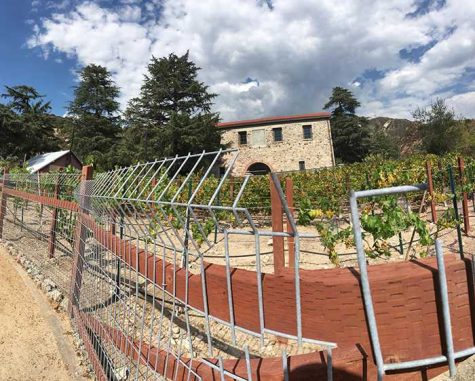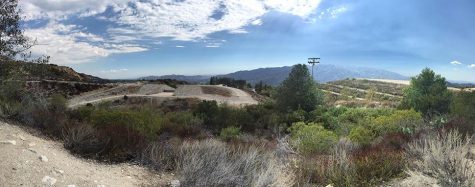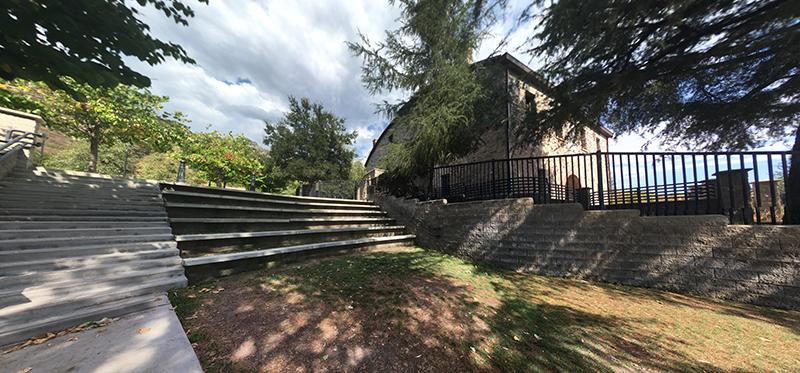The steps of the Mesnager Farm are a peaceful spot to rest at
Spending an hour with transcendentalism
February 6, 2017
As I rested on the steps of the Mesnager Barn at Deukmejian Park in La Crescenta, surrounded by oak trees, I freed my mind of all unnecessary things. Being taught to be one with and absorb the creation of Mother Nature was a suggestion by my 11th grade American Literature teacher, Diana McGrath, who recently taught our class about transcendentalism. In order to put what she taught into action, our class took a field trip to Dunsmore Park in early September where we journaled about our surroundings.
Wanting to further explore what I had experienced at Dunsmore, I took it upon myself to explore transcendentalism and the teachings of famous writers Ralph Waldo Emerson and Henry David Thoreau, the men behind this belief. This idea sprouted and grew in 19th century America when writers brought forth ideas that related loosely to the beliefs of Buddhism, which also puts reason to the fact that divinity exists in all of humanity and nature.
Being a strong believer in this movement, Thoreau went as far as isolating himself from all of society in a small house he built just west of Boston, facing Walden Pond, for two years. During this time of exploring and absorbing nature, he would write about the beauty of the pond and anything that would come across his way.
Taking inspiration from this experiment, I decided I would isolate myself, not for two years, but for an hour. Considering how most of us are constantly connected to social media and our electronic devices on a spiritual level, this, I thought, would be a valid period of time to separate myself from everything.
The location I chose to use in order to disconnect from everything was Deukmejian Wilderness Park, located just north of Clark Magnet High School. Ironically, the area was going through construction, being an interesting combination of modern society taking over and nature fighting to keep itself relevant.
After coming to a disappointing realization that nature will soon be a thing of the past, I sat down on the cascading steps of the majestic 100-year-old Mesnager Barn and allowed myself to absorb all the life of this small piece of still existent nature.
At first, like anyone brainwashed by social media and electronics, I felt boredom instantly take over, constantly urging me to think of all the things I could be doing instead of sitting at the steps of a barn. Forcing myself to finish what I had begun though, I grabbed my pencil and notebook, and began writing about the various ways in which nature was coming to life.
Slowly but surely, the bitterness and distaste that I had with having to waste an hour of my life, which could have gone to more brainwashing with social media, changed to a combination of appreciation and gloom. The appreciation being the fact that nature by itself was an absolute work of art, one no artist of any acclaim could forge onto a canvas, overtaken by how this beauty was being depleted for the capitalist gains of America.

The Mesnager Barn blanketed under the vast clouds
A half an hour or so in, my mind began to wander off into the mesmerizing beauty of all the plant and animal life in front of my very eyes. I could feel myself being submerged into the grass, being surrounded by the large oak trees, the brown and white buckwheat and the small bluish pigeons.
Wanting to explore my newfound freedom from the shackles of society, I walked around, examining the flowers, which at first seemed to have been dried up from the Californian heat, but at second glance were just painted a beautiful dark and light brown.
After seeing the perennial statice, I strolled towards the very old, but marvelous Mesnager Barn, built on a property acquired by George Le Mesnager in 1898. Fall being the season when grapes thrive, the vines had taken over the thin wooden pedestals and had created a small forest of grape leaves. As I looked closely, these small round spheres of mother nature’s fruits, I assumed, would most likely have been grown to produce white wine.
I appreciated the care that went into this small plot of land, as I knew now how important it was to preserve the nature that was given to us and not take advantage of something so defenseless. This is something society must work on preserving, because one day we may realize that this puzzle piece of our lives has become one with history, after which we will reminisce about, wondering why we tore it down to build up our concrete jungles.
Leaving Deukmejian Wilderness Park, I felt highly affected by this experience. It came to my attention that the conservation of something that makes up such a large part of our lives begins with one person. Through this transcendentalism experiment, not only did I become one with nature, but I also found divinity in everything I surrounded myself with that day.
Being a critic of this belief, I was surprised at how my mindset changed by the simple disconnection from social media, and all things electronic.
Returning to where this began, other students in McGrath’s class also reported similar types of inspirations. “I agree with the fact that less truly is more, and that people should definitely appreciate what they do have instead of complaining what they don’t have,” said junior Sevak Kazaryan. Before learning about Thoreau and the appreciation of life, Kazaryan said that he already would limit phone use and put more time into constructive activity, something most teenagers and young adults do not choose to do much of.
Stephanie Sajjadieh, a teacher who at Clark Magnet High School who visited Walden Pond in 2004 during the wintertime, described it as “a religious experience,” noting the heavenly beauty of the pond, especially during the colder months in Boston. She also said that a former student of hers actually traveled to Boston to visit Walden Pond and reported the experience as “unforgettable.”
Over the 30 years that Sajjadieh has been teaching about Walden Pond and Thoreau’s transcendental journey, she said that has seen how reading the book and learning about transcendentalism positively influenced students’ interest in meditation and temporarily encouraged them to remove technology and to consider nature as a part of their lives.
McGrath said that she taught our American Literature class about Thoreau’s experiment because it resonated with her own experiences as a child. “Growing up, my backyard was a huge meadow with a small creek, where I would play every single day,” she said.
2016 marks 162 years since Thoreau’s memoir, Walden, was published. Being a belief so applicable to daily life, many famous artists and leaders have practiced transcendentalism, including singer Katy Perry, who in an interview with Transcendental Meditation said, “I start my day with transcendental meditation.” Also, Indian independence leader Mahatma Gandhi, who led a march against British dominance of its imperial colonies, was also a reader Thoreau’s teachings and practiced civil disobedience.

Beautiful views of widely spanning nature
